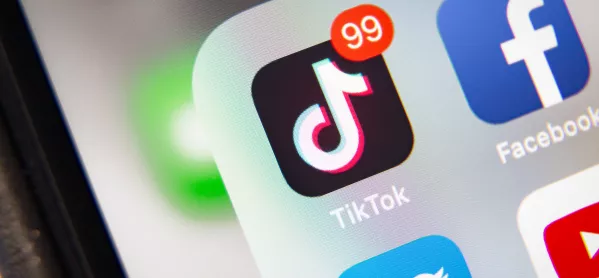- Home
- Should teachers be on TikTok?
Should teachers be on TikTok?

“Dirty lesbian,” says the teaching assistant (TA).
She looks nonplussed.
“2/10 for originality, because I am actually gay,” she says.
She scrolls to the next comment. She is reading the insults left for her by students.
“Miss, you look way better with makeup on,” she says.
This time she looks more offended: “10/10 - the objective of hurting my feelings was met,” she says.
Teacher TikTok is here
It’s not school books these comments are written on, of course: students have not got that brazen yet.
Instead, the TA is scrolling through TikTok comments. Comments made on her own TikTok page. Comments made on her own TikTok videos. And this reading of the comments and commenting on the comments, that’s a video on TikTok, too.
That may shock you, but this TA is just one of thousands of school staff making content on TikTok right now. If you look up #teachersoftiktok, you can find educators from all over the world making videos targeted at other teachers and, at times, their students.
Social media safeguarding
In a profession usually so social media aware - and with schools usually having strict social media policies owing to safeguarding protocols - the sheer amount of freely available content featuring school staff is surprising.
The fact so much of that content features identifiable staff members, school buildings and even a teacher’s students makes it even more of a shock.
So do their schools know the content is being posted? If they did, would the teacher be told to close the account down? Or is TikTok a way of connecting with students, connecting with colleagues and improving wellbeing that, when used properly and responsibly, should be embraced?
School rules
Unexpectedly, some schools fall into the latter category. Deputy head Paul Hume says that he loves “that [TikTok] is focused on providing fun and positivity to cheer everyone up, especially in recent months”.
He doesn’t see a problem with teachers using the app as long as they “adhere to the usual professional expectations”.
At the other end of the spectrum, one headteacher, who wishes to remain anonymous, says that “TikTok is counterproductive to the aims of being employed by a school as a teacher if they are using their status as a teacher on it”.
Going viral
They explain that you would not want to see medical professionals in their place of work using their credentials and recording video intended to entertain. A person’s job and personal life should, they believe, be kept separate. (They may be alarmed to hear that medical TikTok is just as bustling as teacher TikTok.)
In the middle of the two extremes is where many schools will find themselves. Martin Kelsey, a primary school headteacher, has a more restrained view on TikTok, saying, “Like with all social media, staff should take a cautious approach, use the privacy settings where available and ensure content is appropriate.”
Get the privacy settings right
He adds, though, that it’s “difficult to be anonymous if you’re in the videos”.
He also says teachers need to be cautious about who follows them.
“They shouldn’t be allowing pupils to follow, etc. Which I think is hard to achieve unless approving each follower,” he explains.
The issue here is that it is incredibly difficult to manage who exactly is following you on TikTok.
So would schools be better off discouraging staff from being on it all together?
The legal view
Jean Boyle, an education lawyer with Stone King LLP, says that “schools really need to consider the principles of safeguarding and teachers standards”.
“Quite often, TikTok videos will be filmed in an employee’s home,” she says. “They have to be careful of their content and what is seen in those particular videos.
“For schools, it’s about having an effective social media policy in place. Many schools are on top of this and are becoming sophisticated in relation to their social media policy, but I think some schools still lag behind, and that leads to some difficulty”.
And if a school deems that a video breaches those policies?
“If there are allegations that they have breached that policy, depending on the seriousness of that breach, it could be a disciplinary matter,” says Boyle.
Hidden in plain sight
The difficulty, of course, is finding a video that breaches a policy.
The anonymous headteacher concedes that “it will be, and probably is, self-policing”.
But they add that if something inappropriate does occur, it will likely get back to the school eventually.
Boyle agrees: “Over the years, I’ve advised on a number of very serious disciplinary matters that have arisen from social media platforms”.
So does this all mean you shouldn’t be on TikTok?
Not necessarily. It just means that you should be very careful in meeting all of your school’s safeguarding policy points if you are.
Keep reading for just £1 per month
You've reached your limit of free articles this month. Subscribe for £1 per month for three months and get:
- Unlimited access to all Tes magazine content
- Exclusive subscriber-only stories
- Award-winning email newsletters



